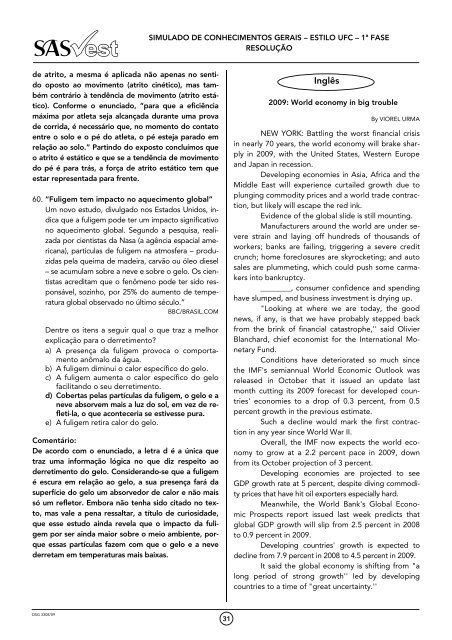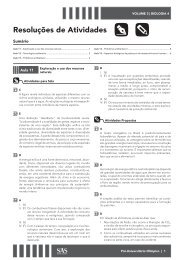1º SIMULADO – CONHECIMENTOS GERAIS - 1ª FASE ... - SAS
1º SIMULADO – CONHECIMENTOS GERAIS - 1ª FASE ... - SAS
1º SIMULADO – CONHECIMENTOS GERAIS - 1ª FASE ... - SAS
You also want an ePaper? Increase the reach of your titles
YUMPU automatically turns print PDFs into web optimized ePapers that Google loves.
de atrito, a mesma é aplicada não apenas no sentido<br />
oposto ao movimento (atrito cinético), mas também<br />
contrário à tendência de movimento (atrito estático).<br />
Conforme o enunciado, “para que a eficiência<br />
máxima por atleta seja alcançada durante uma prova<br />
de corrida, é necessário que, no momento do contato<br />
entre o solo e o pé do atleta, o pé esteja parado em<br />
relação ao solo.” Partindo do exposto concluímos que<br />
o atrito é estático e que se a tendência de movimento<br />
do pé é para trás, a força de atrito estático tem que<br />
estar representada para frente.<br />
60. “Fuligem tem impacto no aquecimento global”<br />
Um novo estudo, divulgado nos Estados Unidos, indica<br />
que a fuligem pode ter um impacto significativo<br />
no aquecimento global. Segundo a pesquisa, realizada<br />
por cientistas da Nasa (a agência espacial americana),<br />
partículas de fuligem na atmosfera <strong>–</strong> produzidas<br />
pela queima de madeira, carvão ou óleo diesel<br />
<strong>–</strong> se acumulam sobre a neve e sobre o gelo. Os cientistas<br />
acreditam que o fenômeno pode ter sido responsável,<br />
sozinho, por 25% do aumento de temperatura<br />
global observado no último século.”<br />
BBC/BRASIL.COM<br />
OSG 3308/09<br />
Dentre os itens a seguir qual o que traz a melhor<br />
explicação para o derretimento?<br />
a) A presença da fuligem provoca o comportamento<br />
anômalo da água.<br />
b) A fuligem diminui o calor específico do gelo.<br />
c) A fuligem aumenta o calor específico do gelo<br />
facilitando o seu derretimento.<br />
d) Cobertas pelas partículas da fuligem, o gelo e a<br />
neve absorvem mais a luz do sol, em vez de refleti-la,<br />
o que aconteceria se estivesse pura.<br />
e) A fuligem retira calor do gelo.<br />
Comentário:<br />
De acordo com o enunciado, a letra d é a única que<br />
traz uma informação lógica no que diz respeito ao<br />
derretimento do gelo. Considerando-se que a fuligem<br />
é escura em relação ao gelo, a sua presença fará da<br />
superfície do gelo um absorvedor de calor e não mais<br />
só um refletor. Embora não tenha sido citado no texto,<br />
mas vale a pena ressaltar, a título de curiosidade,<br />
que esse estudo ainda revela que o impacto da fuligem<br />
por ser ainda maior sobre o meio ambiente, porque<br />
essas partículas fazem com que o gelo e a neve<br />
derretam em temperaturas mais baixas.<br />
<strong>SIMULADO</strong> DE <strong>CONHECIMENTOS</strong> <strong>GERAIS</strong> <strong>–</strong> ESTILO UFC <strong>–</strong> <strong>1ª</strong> <strong>FASE</strong><br />
RESOLUÇÃO<br />
31<br />
Inglês<br />
2009: World economy in big trouble<br />
By VIOREL URMA<br />
NEW YORK: Battling the worst financial crisis<br />
in nearly 70 years, the world economy will brake sharply<br />
in 2009, with the United States, Western Europe<br />
and Japan in recession.<br />
Developing economies in Asia, Africa and the<br />
Middle East will experience curtailed growth due to<br />
plunging commodity prices and a world trade contraction,<br />
but likely will escape the red ink.<br />
Evidence of the global slide is still mounting.<br />
Manufacturers around the world are under severe<br />
strain and laying off hundreds of thousands of<br />
workers; banks are failing, triggering a severe credit<br />
crunch; home foreclosures are skyrocketing; and auto<br />
sales are plummeting, which could push some carmakers<br />
into bankruptcy.<br />
________, consumer confidence and spending<br />
have slumped, and business investment is drying up.<br />
"Looking at where we are today, the good<br />
news, if any, is that we have probably stepped back<br />
from the brink of financial catastrophe,'' said Olivier<br />
Blanchard, chief economist for the International Monetary<br />
Fund.<br />
Conditions have deteriorated so much since<br />
the IMF's semiannual World Economic Outlook was<br />
released in October that it issued an update last<br />
month cutting its 2009 forecast for developed countries'<br />
economies to a drop of 0.3 percent, from 0.5<br />
percent growth in the previous estimate.<br />
Such a decline would mark the first contraction<br />
in any year since World War II.<br />
Overall, the IMF now expects the world economy<br />
to grow at a 2.2 percent pace in 2009, down<br />
from its October projection of 3 percent.<br />
Developing economies are projected to see<br />
GDP growth rate at 5 percent, despite diving commodity<br />
prices that have hit oil exporters especially hard.<br />
Meanwhile, the World Bank's Global Economic<br />
Prospects report issued last week predicts that<br />
global GDP growth will slip from 2.5 percent in 2008<br />
to 0.9 percent in 2009.<br />
Developing countries' growth is expected to<br />
decline from 7.9 percent in 2008 to 4.5 percent in 2009.<br />
It said the global economy is shifting from "a<br />
long period of strong growth'' led by developing<br />
countries to a time of "great uncertainty.''



